CIRCLES CALCULATE AREA CIRCUMFERENCE RADIUS AND DIAMETER
Subscribe to our ▶️ YouTube channel 🔴 for the latest videos, updates, and tips.
Radius :
The radius is a line segment with one end point at the center and the other end on the circle. It is denoted by ‘r’.
Diameter :
Diameter is a chord passing through the center of the circle. It is denoted by ‘d’.
The diameter is the longest chord. It is twice the radius.(i.e. d = 2r)
Circumference :
Can we find the distance covered by an athlete if he takes two rounds on a circular track. Since it is a circular track, we cannot use the ruler to find out the distance.
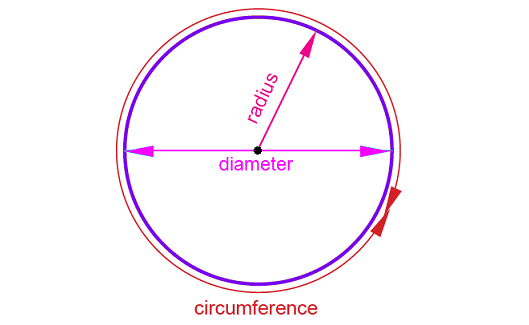
The distance around a circle is called the circumference of the circle, which is denoted by ‘C’.
Circumference of circle = 2πr
Area of circle :
The area of a circle is the number of square units inside that circle
Area of circle = πr2
Example 1 :
Find the circumference of a circle whose diameter is 21 cm.
Solution :
Diameter = 21 cm
Radius = 21/2 = 10.5 cm
Circumference of circle = 2 π r
= 2 (22/7) x 10.5
= 44 x 1.5
= 66 cm
Hence the circumference of circle is 66 cm.
Example 2 :
A wire of length 88 cm is bent as a circle. What is the radius of the circle?
Solution :
Length of the wire = circumference of the circle
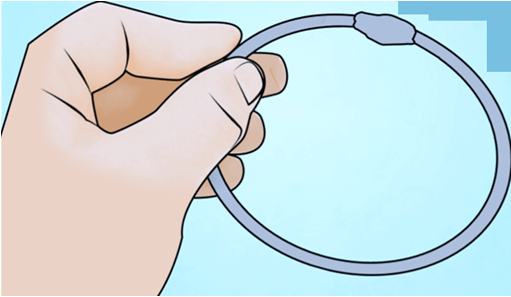
2 π r = 88 cm
2 x (22/7) x r = 88
r = (88 x 7)/(2 x 22)
r = 14 cm
Hence the radius of the circle is 14 cm
Example 3 :
The diameter of a bicycle wheel is 63 cm. How much distance will it cover in 20 revolutions?
Solution :
When a wheel makes one complete revolutions,
Distance covered in one rotation = Circumference of wheel
Circumference of the wheel = 2πr units
= 2 x (22/7) x (63/2) cm
= 22 x 9 = 198 cm
For one revolution, the distance covered = 198 cm
For 20 revolutions, the distance covered = 20 × 198 cm
= 3960 cm
= 39 m 60 cm [100 cm = 1 m]
Hence the distance covered in 20 revolution is 39 m 60 cm
Example 4 :
A scooter wheel makes 50 revolutions to cover a distance of 8800 cm. Find the radius of the wheel.
Solution :
Distance travelled
= Number of revolutions/Circumference
2πr = 8800/50
2πr = 176
2 x (22/7) x r = 176
r = 176 x (7/22) x (1/2)
r = 28 cm
Hence the radius of the wheel is 28 cm
Example 5 :
The radius of a cart wheel is 70 cm. How many revolution does it make in travelling a distance of 132 m?
Solution :
Given: r = 70 cm, Distance travelled = 132 m.
Circumference of a cart wheel = 2πr
= 2 x (22/7) x 70
= 440 cm
Distance travelled
= Number of revolutions x Circumference
Number of revolutions
= Distance travelled/Circumference
= 132 m/440 cm
= 13200/440
= 30
Hence the number of revolution is 30.
Example 6 :
A lawn sprinkler sprays water onto part of a circular region, as shown below.
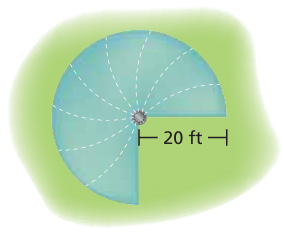
Part A : What is the area, in square feet, of the region that the sprinkler sprays with water? Show your work and explain your reasoning. (Use 3.14 for π)
Part B : What is the perimeter, in feet, of the region that the sprinkler sprays with water? Show your work and explain your reasoning. (Use 3.14 for π .)
Solution :
a) Area of region that sprinkle sprays with water =
Area of semicircle + area of quarter circle
= (1/2) πr2 + (1/4) πr2
= (3/4) πr2
Radius = 20 ft
= (3/4) x 3.14 x 202
= 942 square feet
b) Perimeter of the region
= Circumference of semicircle + circumference of quarter circle
= πr + (1/2) πr
= (3/2)πr
= (3/2) x 3.14 x 20
= 94.2 feet
Example 7 :
A desktop is shaped like a semicircle with a diameter of 28 inches. What is the area of the desktop?
Solution :
Diameter = 28 inches
radius = 14 inches
Area of the semicircle desktop = (1/2)πr2
= (1/2) x 3.14 x 142
= 0.5 x 3.14 x 196
= 307.72 square inches
Example 8 :
The circular rug is placed on a square floor. The rug touches all four walls. How much of the floor space is not covered by the rug?
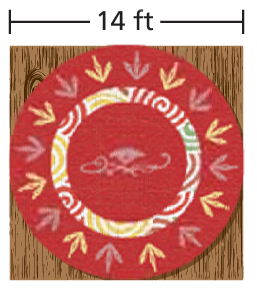
Solution :
Diameter = 14 ft
Radius = 7 ft
Area of circular rug = πr2
= 3.14 x 72
= 3.14 x 49
= 153.86 square ft
Example 9 :
A dog is leashed to the corner of a house. How much running area does the dog have? Explain how you found your answer.
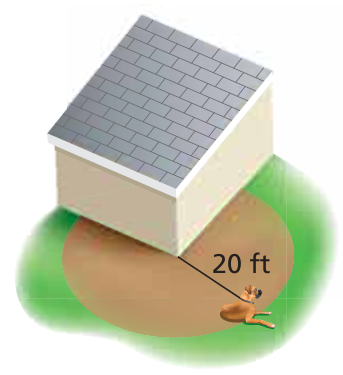
Solution :
Area covered by the dog = (3/4) of area of circle
radius = 20 ft
= (3/4) πr2
= 0.75 x 3.14 x 202
= 942 square feet
Example 10 :
Is the area of a semicircle with a diameter of x greater than, less than, or equal to the area of a circle with a diameter of (1/2) x ? Explain.
Solution :
Diameter of semicircle = x
Radius of semicircle = x/2
Area of semicircle = (1/2) πr2
= (1/2) ⋅ 3.14 ⋅ (x/2)2
= 0.5 ⋅ 3.14 ⋅ (x/4)
= 0.3925x
Radius of circle = (x/2)/2
= x/4
Area of semicircle = (1/2) πr2
= (1/2) ⋅ 3.14 ⋅ (x/4)2
= 0.5 ⋅ 3.14 ⋅ (x/16)
= 0.098125 x
Area of semicircle is greater.
Subscribe to our ▶️ YouTube channel 🔴 for the latest videos, updates, and tips.
Kindly mail your feedback to v4formath@gmail.com
We always appreciate your feedback.
About Us | Contact Us | Privacy Policy
©All rights reserved. onlinemath4all.com

Recent Articles
-
10 Tricky SAT Math Questions with Answers
Feb 04, 26 07:08 PM
10 Tricky SAT Math Questions with Answers -
The 10 Hardest SAT Math Questions
Feb 04, 26 09:43 AM
The 10 Hardest SAT Math Questions -
The 10 Most Difficult SAT Math Questions
Feb 04, 26 09:14 AM
The 10 Most Difficult SAT Math Questions

